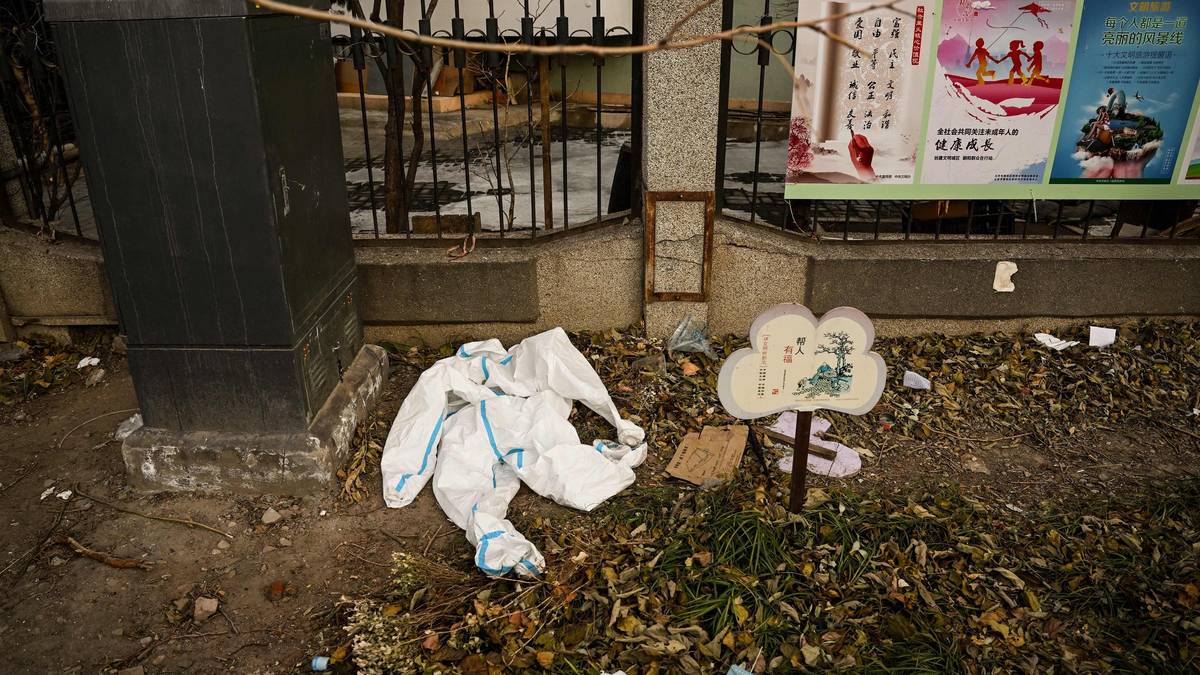China abruptly scrapped its strict infection control regime on December 7th, after insisting on a strict no-virus policy for nearly three years.
It also reduces the need for infection control equipment, testing stations and people working in such settings.
The videos are said to show employees protesting at the Zybio factory in Chongqing
Mass protests
At a factory in Chongqing, the situation is said to have led to massive protests last weekend.
Almost half of the 20,000 employees in Zybio (Zhongyuan Huiji), Those undertaking corona tests must have been asked to take early leave. In practical terms, this must mean that they are separated.
Many of them must have payments due. This was written by the China Labor Bulletin of the workers’ rights organization (CLB).
Video clips from local media have been posted on TwitterProtesters are shown throwing equipment and plastic boxes at security guards and police. They block the streets, light fires outside the factory, and shout their demands.
The factory finally met them. Workers’ wages have been adjusted.

People in white have been a huge part of the city scene in China. This photo is from Shanghai in December 2022.
Photo: Hector Retamal/AFP
The whites disappear
– Dismissals at the factory in Chongqing are related to the change in Corona policy, as parts of production were closed on demand antigen Get down, says Aidan Chau at CLB to NRK.
There was also a similar protest in Hangzhou over the weekend, and there are likely to be more.
– We expect more protests involving employees in 2023, because an economic downturn is expected this year, says Zhao.
At the same time, the army of people in white suits and goggles disappeared from the city’s sight.
They dominated the daily life of the Chinese, earning the title “Dabai” 大白the meaning “The Great Whites”.
Millions of people dressed in white led people into long test lines in the streets. They shoved test sticks down people’s throats and deep into their noses. Equipped with large pressure canisters, they sprayed disinfectants on the streets.

Infection control officers in white were everywhere in the street scene. Now most of them have disappeared after the massive infection control was dismantled
Photo: NOEL CELIS/AFP
The army of the unemployed
They have guarded themselves in quarantined hotels, on the subway, and outside restaurants and malls. Sometimes they put signs at the entrance to the grocery store.
They were anonymous, like bots, and disappeared completely overnight.
And the newspaper wrote that for a short period of time, some of them turned to selling compound packages to the Chinese infected with Corona SCMP.
The packages contain not only Western fever medicine and headache tablets, but also Chinese herbal medicine lianhua qingwenwhich the Chinese authorities encourage people to use.
It is said that the peak of infection has been reached in Chinese cities, and although the powerful wave of infection will likely reach the countryside soon, the need for packages has decreased rapidly.
Many of those in white were seconded bureaucrats and some were volunteers, but the millions who worked as infection control officers are now an army of unemployed.

Chinese people wearing protective suits in Beijing, December 2022
Photo: Ken Moritsugu/AP
temporary agencies
Zhao says he is not well aware of the unemployment situation among the infection control staff, but he wouldn’t be surprised if there were more disputes over wages.
Most of them are employed by temporary agencies, and it is common for them to get rid of workers without giving them compensation, when the need for labor is reduced.
It shows that the Chinese economy actually slowed last year.
The report stated that one in five Chinese youth was unemployed last fall CNN.
Many believe that China’s reopening of society will be beneficial in the long run for both the Chinese and global economies, even if the first months will be chaotic.
challenges
– The authorities are desperate for an economic comeback in 2023. Some of this will happen when people are no longer afraid that the virus is dangerous, because then they will visit restaurants again and spend money.
This is what author and economist George Magnus, associated with the China Center at Oxford University, told NRK.

George Magnus is an economist and author. It is associated with the University of Oxford’s China Centre
Image: University of Oxford
He believes in a recovery in a few weeks and that it will last a few months, but it will be short-lived anyway.
China has major challenges that began even before the pandemic.
– I’m not sure that the middle class will have the bright future they expected when Xi Jinping first came to power. Magnus says I would estimate growth of 2.5 to 3.5 percent.
Magnus believes that many young people in China have become suspicious of the regime’s control over the situation.

There is almost no use for infection control workers like these anymore
Photo: Hector Retamal/AFP
When China managed to stop the first outbreak of Corona, the authorities received great support from the people. The Chinese lived almost normal lives while the virus swept the world outside.
The arrival of Omikrom changed everything.
The continuous and prolonged lockdowns of Chinese cities with a population of millions have left deep frustration in the population. The abrupt cancellation of infection control measures did not create confidence either.
Lack of confidence is not what a country needs to grow.
For young people, the work and income situation is much less promising than it used to be. Many point to experiences gained in the pandemic that have eroded their trust in authorities and their joy and optimism, says Magnus.

An infection control worker at work at a coronavirus testing station in Shanghai in December
Photo: Hector Retamal/AFP

“Organizer. Social media geek. General communicator. Bacon scholar. Proud pop culture trailblazer.”

